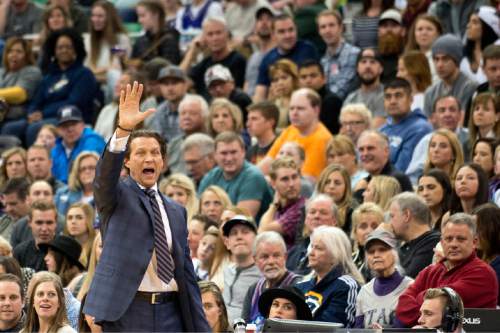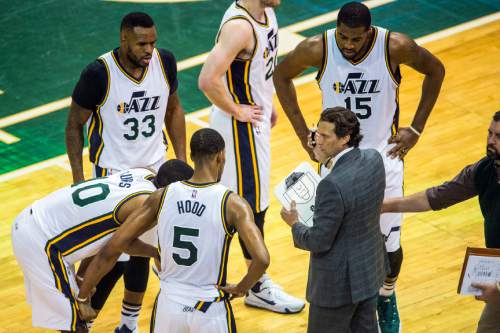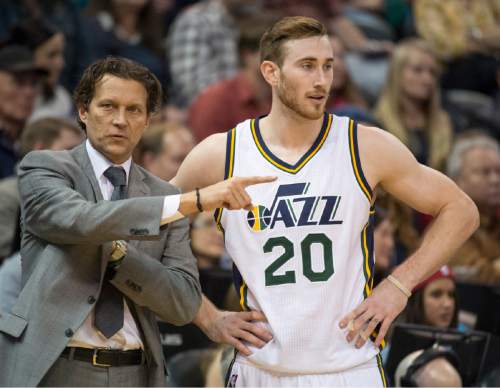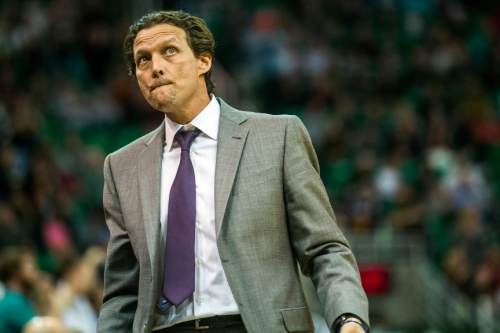This is an archived article that was published on sltrib.com in 2016, and information in the article may be outdated. It is provided only for personal research purposes and may not be reprinted.
In a quiet moment, not long after the Jazz beat the Chicago Bulls in overtime Monday night, Quin Snyder said something compelling. He said something that, to those with ears and eyes to hear and see, reveals not just his approach to his team and its struggles, to basketball and the difficulties the NBA game presents, but his approach to life and its many undulations.
He said: "There are always challenges, a lot of challenges. I feel like adversity is something I'm comfortable with. I just want to see everything with the right perspective."
That comfortable companion and that right perspective are what landed Snyder in Utah to begin with. It's what enabled him to overcome trials in his past. It's what has made the tribulations of an arduous season tolerable and, more importantly, conquerable. Adversity may not be Snyder's best friend, but it is, at least, a familiar shadow he can abide and out of which he can step and step ahead.
In the coach's vernacular: "Adversity is opportunity in disguise."
It's been a brutal, brilliant one this season.
Dante Exum blows out a knee. Rudy Gobert sprains an MCL. Derrick Favors aggravates his back. Alec Burks breaks a leg. And the young Jazz, while losing more minutes from key players and suffering more plagues than any other team this side of the Egyptian Pharaohs, start looking for pianos to fall out of the sky onto their heads.
But Snyder declined to let his — or their — focus wander too far off target, or to allow self-pity to cloud his — or their — vision.
Instead, he gathered his young team around him, what was left of it, and told his players to keep working and grinding away and, eventually, happier results would come.
Maybe that's happening now. For the first time this season, the Jazz are on a three-game win streak.
"Our guys really chose to believe that," Snyder said. "It wasn't just something we were talking about. … The goal was to get better while all this was going on. If that meant winning, great. We wanted to make sure, no matter what, that the whole was greater than the sum of the parts."
Even — especially — when a lot of the parts were broken, healing and unavailable.
"Then," he said, "as we add old parts and new parts, we can go on improving. This is a situation that, as difficult as it has been, presented us with some opportunities to get better. The bottom line is, this is a high-character group of guys. There's great leadership in the locker room. Everybody's bought in."
Snyder paused, took in a breath, then he said: "When you're faced with something very difficult, you find out what you're capable of."
Added Rodney Hood: "One of his favorite quotes is, 'This too shall pass.' Going through the injuries and losing games late, as a young team, sometimes you get down on yourselves. But all of that makes you stronger. We're starting to show that strength now. As we're battling, he always says, 'Better days will come.' "
Snyder would know.
The kid who grew up on Seattle's Mercer Island, in the same community where evidence of America's fulfilled dreams and big corporate success lives, he was a two-time Washington prep player of the year. He went to Duke, where he played in three Final Fours. He earned undergraduate degrees in political science and philosophy, as well as a law degree and an MBA along the way. At the age of 32, he was the head coach at Missouri. Basketball and the Fates themselves both embraced him.
And then … the bottom dropped out. Losing, on the court and off it, leveled him. Professional and personal problems laid him low. Opportunity showed up in its cloak and costume.
Snyder greeted it by finding out what he was capable of. He scrambled through basketball's bushes. He coached the D-League's Austin Toros. He hooked on as an assistant in Philadelphia, in Los Angeles, in Moscow, in Atlanta. He worked hard, developed talent and learned his craft, all in the background. He smiled at adversity, made the shadow his friend.
It is whispered that one of the reasons Greg Miller hired Snyder as the Jazz's head coach is because the man picked himself up after getting road-graded, finding fortitude in misfortune. Given what's happened this season, that was a more enlightened move than it seemed at the time.
Even last year, when Snyder set out to turn the Jazz into a transition team that fed off of defense, after losing 19 of his first 25 games, and 34 of his first 53, he altered that plan, underscoring defense and making his players offensively deliberate. Next thing, they went 19-10.
This time around, Snyder relied on Gordon Hayward and Hood, as the others healed and learned. "Those guys locked arms," he said. "As much as Gordon has stepped up, he's helping others step up, too. … There was nowhere else to go."
On Monday night, the Jazz stepped up together, following Hayward's lead, beating the Bulls, and while Snyder realized there's a whole lot more stepping up needed, the stepping that's already been done isn't half-bad. "I like to think," he said, "that we're improving, just maximizing what we can be."
Snyder deserves much of the credit for that. Not every coaching decision has worked out. He's made some mistakes. But he's also built something, rather remarkably, out of the debris. When pianos were dropping out of the sky, he kept his players driven and dialed in.
"There are always challenges, a lot of challenges," he was saying. "I feel like adversity is something I'm comfortable with. I just want to see everything with the right perspective."
So, there are. It is. He does.
GORDON MONSON hosts "The Big Show" with Spence Checketts weekdays from 3-7 p.m. on 97.5 FM and 1280 AM The Zone. Twitter: @GordonMonson.









